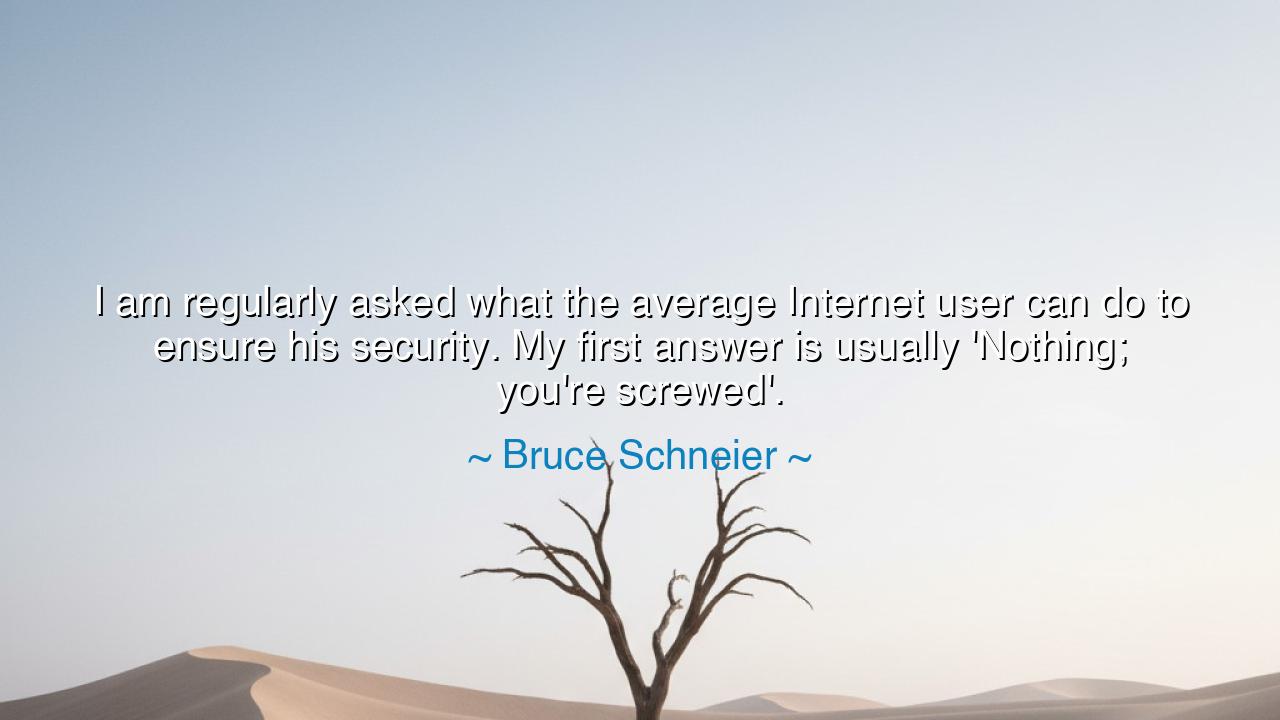
I am regularly asked what the average Internet user can do to
I am regularly asked what the average Internet user can do to ensure his security. My first answer is usually 'Nothing; you're screwed'.






Bruce Schneier’s words, “I am regularly asked what the average Internet user can do to ensure his security. My first answer is usually 'Nothing; you're screwed,’” are a profound reflection on the vulnerabilities we face in the modern digital world. Schneier’s statement, though blunt and perhaps unsettling, speaks to the overwhelming complexity of cybersecurity in today’s interconnected age. For all the advancements we’ve made in technology, the average individual often finds themselves powerless in the face of the vast and ever-evolving threats that lurk within the digital world. Like a warrior caught in a storm with no shield to protect them, they are vulnerable to attacks they can neither predict nor fully defend against. Schneier’s words capture the sobering reality that while we may have the tools of modern technology, we often lack the true security to protect ourselves from the forces we cannot see.
In the ancient world, security was also a vital concern, though it took a different form. The ancient Greeks were highly aware of the importance of protection—not just in the form of military defense, but in the strength of their city-states and alliances. They built walls, created strategic alliances, and devised defense tactics to protect their people and preserve their way of life. Yet, despite these precautions, the city-state of Troy was brought down by the Trojan Horse—a symbol of how even the strongest fortifications can be penetrated by deception and ingenuity. Schneier’s words echo this lesson: no matter how many firewalls or security measures are in place, there are forces beyond the control of the individual—hacking, surveillance, and exploitation—that may bypass them and strike when least expected.
The modern digital age is a double-edged sword. Just as the ancients created tools and fortresses to protect themselves, we have created digital tools—firewalls, encryption, and security protocols—to safeguard our online presence. Yet, just as the walls of Troy fell, so too do these defenses face threats from advanced technologies and human ingenuity. Consider the rise of phishing attacks, ransomware, and data breaches that have become routine occurrences in the digital landscape. The story of the Equifax breach—where personal information of over 147 million people was compromised—serves as a stark reminder that even the most trusted institutions can fail to protect our personal security. In this world, Schneier’s statement offers a hard truth: there is no perfect defense, and the average user, despite their best efforts, is often exposed to forces beyond their control.
In the ancient Chinese text, The Art of War by Sun Tzu, the strategist emphasizes the importance of understanding the enemy and using that knowledge to gain victory. The battlefield of cybersecurity today is no different. The enemy is not a visible foe with a sword or shield, but a complex web of digital threats that can attack without warning. In much the same way Sun Tzu advocated for preparedness and awareness, Schneier suggests that we must acknowledge the limits of our ability to secure ourselves against the invisible dangers of the digital age. The key, then, is not to believe that we are invulnerable, but to take measured actions—such as regular updates, careful monitoring, and cautious behavior—to minimize risk. Even in ancient battles, knowing that defeat was sometimes inevitable did not stop warriors from preparing for the fight. Likewise, in today’s digital world, we must prepare for the fight, knowing that full security is elusive.
This lack of total security calls to mind the ancient myth of Pandora’s Box. When Pandora opened the box, she released evils upon the world—sickness, sorrow, and death. But at the bottom of the box, there remained one thing: hope. The hope that, despite the dangers and suffering, there is still the possibility of recovery and resilience. Schneier’s words reflect a similar reality: while complete security may be beyond the reach of the average Internet user, there is still hope. Hope lies in awareness, education, and vigilance—in understanding the risks we face and acting to mitigate them where possible. Like the ancient warrior who must adapt to unforeseen dangers, we too must adapt and strengthen our defenses in an ever-changing world.
Schneier’s statement is not a call for despair, but a challenge to recognize the world as it is. The ancients did not cower in fear before their enemies but embraced the reality of danger and took pragmatic steps to defend themselves. The truth that Schneier speaks is similar to the wisdom of the ancients: prepare as best you can, understand the limitations of your defenses, and know that you are part of a larger system, one where forces outside of your control will sometimes dictate the outcome. Strength is not found in foolish optimism, but in awareness of your vulnerabilities and a commitment to proactive defense.
Lesson for the ages:
True security comes not from believing we are invulnerable, but from recognizing our vulnerabilities and preparing to face them. Like the warriors of the ancient world, we must educate ourselves, adapt, and fortify what we can, while accepting that some forces are beyond our control. Technology can empower us, but it also requires constant vigilance. Prepare, but understand that perfection in security is a mirage.
Practical Action:
In your daily life, understand the risks you face in the digital realm, and take steps to protect yourself. Educate yourself on the basics of cybersecurity—use strong passwords, avoid suspicious links, update your software regularly, and be cautious with your personal information. Yet, also acknowledge that no defense is foolproof. Adapt to the ever-evolving landscape of threats, and, like the ancients, embrace the wisdom of resilience. Even in a world where security may seem out of reach, your awareness and preparedness are your greatest weapons.






AAdministratorAdministrator
Welcome, honored guests. Please leave a comment, we will respond soon